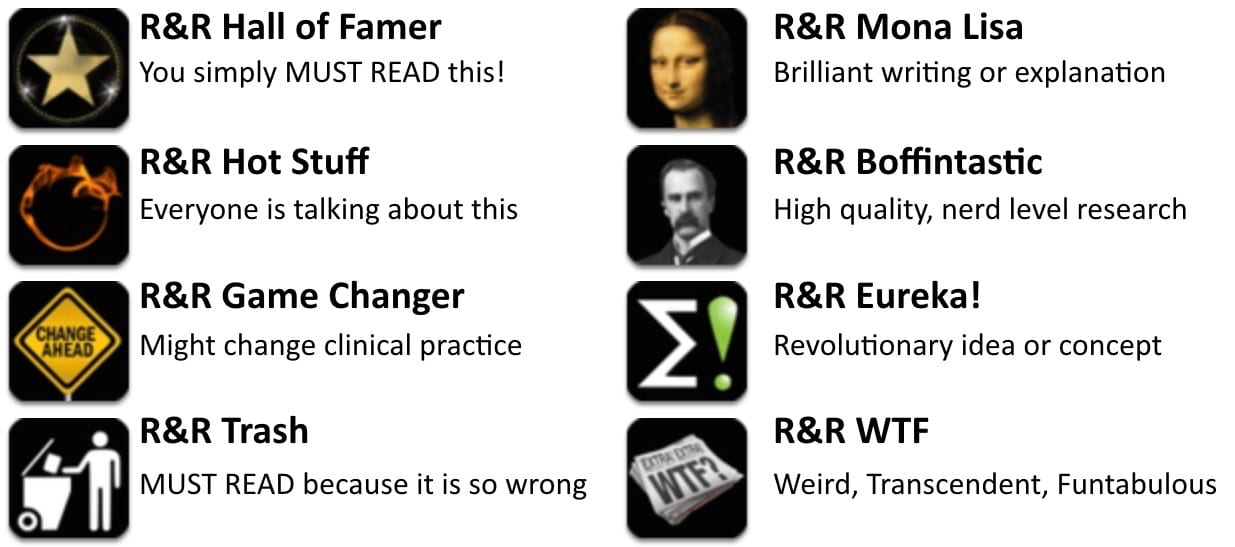R&R In The FASTLANE 164
Welcome to the 164th edition of Research and Reviews in the Fastlane. R&R in the Fastlane is a free resource that harnesses the power of social media to allow some of the best and brightest emergency medicine and critical care clinicians from all over the world tell us what they think is worth reading from the published literature.
This edition contains 6 recommended reads. The R&R Editorial Team includes Jeremy Fried, Nudrat Rashid, Soren Rudolph, Anand Swaminathan and, of course, Chris Nickson. Find more R&R in the Fastlane reviews in the : Overview; Archives and Contributors
This Edition’s R&R Hall of Famer
Keh D et al. Effect of Hydrocortisone on Development of Shock Among Patients With Severe Sepsis: The HYPRESS Randomized clinical Trial. JAMA 2016 PMID: 27695824
- The use of hydrocortisone in adults with severe sepsis not in septic shock, did not reduce the risk of septic shock within 14 days, but the results of this study should be interpreted with caution as this study was under powered to detect this outcome (i.e. An inconclusive study)
- Recommended by Salim R. Rezaie
Weiss CH et al. Low Tidal Volume Ventilation Use in Acute Respiratory Distress Syndrome. Crit Care Med 2016; 44(8):1515-22 PMID: 27035237
- This is an excellent example of the lag in knowledge translation. Over 12 years have passed since publication of the study touting low tidal volume but uptake remains poor. In this retrospective, cross-sectional study, just 19.3%, or 1 in 5, patients were treated with a low tidal volume approach. Though this is only a small snapshot across 4 hospitals, I don’t think any of us would be surprised to see similar numbers in other hospital systems or even in our own. When we know better, we must do better.
- Recommended by Anand Swaminathan
Riskin A et al. The Impact of Rudeness on Medical Team Performance: A Randomized Trial. Pediatrics. 136(3):487-95. 2015. PMID: 26260718
- This is a fascinating simulation-based randomised controlled trial of how “rudeness” impacts the performance of teams treating critically ill neonates. Remarkably, exposure to “rudeness” accounted for 12% of the variation in the teams diagnostic and procedural performances. The study is methodologically interesting given that it is an RCT studying a complex “social intervention” and the trial’s inherent limitations are worth considering. However, given the concerns we have over sleep deprivation (and so forth) affecting our performance, maybe we need to invest much more in the social detoxification of hospital culture?
- Recommended by Chris Nickson
Arulkumaran N et al. Association between day and time of admission to critical care and acute hospital outcome for unplanned admissions to adult general critical care units: cohort study exploring the ‘weekend effect’. Br J Anaesth. 2016 PMID: 27927721
- This paper caused quite a stir when presented this week at the UK Intensive Care Society Conference given the recent push by the UK’s Health Minister for a 7 day working week. There was no evidence for a “weekend effect” of increased mortality in those admitted to a critical care unit on a weekend or at night. A small increase in mortality was associated with delayed admissions which were more common during weekdays. The reasons behind delayed weekday admissions will almost certainly be a hot topic of discussion for a while.
- Recommended by Virginia Newcombe
Commins SP et al. Delayed anaphylaxis to alpha-gal, an oligosaccharide in mammalian meat. Allergology international. 65(1):16-20. 2016. PMID: 26666477
- This story is fascinating. I actually found it through an excellent Radiolab podcast. If you asked me if adults could suddenly develop a new anaphylactic reaction to red meat (you know, the same stuff that makes up our muscles), I would have said you were crazy. In fact, until a few years ago, almost all allergists would have too. But there were a slew of patients reporting exactly that. Their doctors though they were wrong (or crazy). Then a new cancer drug also started causing a lot of allergic reactions, and the allergist looking into it discovered that the cause was galactose-alpha-1,3-galactose – which also happens to occur in red meat. Why were people suddenly developing an allergy to this almost universal antigen later in life? In turns out that these meat allergies were only being reported in certain communities, and by searching through maps, the allergist was ultimately able to find one that overlapped: the distribution of the lone-star tick (the same tick that carries Rocky Mountain Spotted Fever). It turned out that the tick bites were sensitizing patients to this sugar found in all red meat, and that was resulting in seemingly impossible allergies. Bottom line: First, if you love red meat as much as I do, don’t go hiking anywhere you might find this tick. I mean really, this is scary stuff. And second, it is never a good idea to call patients with unexplained symptoms crazy. Unexplained symptoms will sometimes be explained in the future.
- Recommended by Justin Morgenstern
- Read (listen) more: Alpha Gal (Radiolab)
Soleimanpour H et al. Effectiveness of Intravenous Lidocaine Versus Intravenous Morphine for Patients with Renal Colic in the Emergency Department. BMC Urology 2012; 12(13): 1 – 5 PMID: 22559856
- IV preservative free (cardiac) lidocaine (1.5mg/kg) seems to be another opioid sparing treatment option in our armamentarium to treat renal colic pain in patients without renal, liver, or cardiac disease, however this single study should not change practice of using NSAIDs as first line opioid sparing therapy where available.
- Recommended by Salim R. Rezaie
Community emergency physician with a passion for education, evidence based medicine, and life, working in the Greater Toronto Area (that’s in Canada) | @First10EM | Website |








My suggestion
http://www.annemergmed.com/article/S0196-0644(16)31244-6/fulltext
Happy to provide a review/critical appraisal on this paper